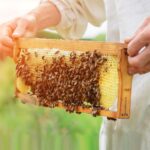World Bee Day is observed across the world on May 20. On this day, beekeeping events are held to educate the general public about the importance of bees and beekeeping. There is a special emphasis on the role of bees as pollinators and how they help to revive forest cover. Because the bee population is under threat, World Bee Day informs us how to protect bees and other pollinators. The Slovenian Beekeepers’ Association took the initiative for World Bee Day, which is now celebrated by environmentalists all over the world.
History of World Bee Day
To protect bees and other pollinators, the Slovenian Beekeepers’ Association launched a campaign in 2014, calling for May 20 to be designated as World Bee Day. The initiative was supported by the Slovenian Government. In 2015, the initiative was co-opted by the largest international beekeepers’ organization, Apimondia.The Ministry of Agriculture, Forestry, and Food of Slovenia traveled around the world with a pavilion called Bee World, actively promoting the projects. Meetings with representatives of other countries and international organizations involved in environmental projects were also organized by the ministry. In 2017, the United Nations’ Economic and Financial Committee adopted a resolution proclaiming World Bee Day. The resolution was unanimously supported by the General Assembly of the U.N., and May 20 was declared World Bee Day. 115 countries including the United States, Canada, China, Russia, India, Brazil, Argentina, Australia, and all E.U. member states, signed on as major sponsors.Bees, as one of the most important pollinators, contribute to food and food security, sustainable agriculture, and biodiversity. Bees also play an important role in climate change mitigation and environmental conservation. It is important to protect bees and the beekeeping industry to combat poverty and hunger, not to mention the significant impact on environmental health and biodiversity. Simply put, without bees, we may never be able to solve the widespread issues of hunger and poverty. These tiny insects are critical to our survival. Scientific studies have proven that bees are becoming increasingly endangered. Every environmentalist and concerned citizen is encouraged to help protect bees and their habitats on World Bee Day.
World Bee Day timeline
Humans discover honey and wax for personal use.
Prehistoric cave paintings in Spain depict beekeeping.
L. L. Langstroth becomes the "father of American beekeeping” for his invention of the modern-day Langstroth hive.
The museum is established in Kluczbork, Poland.
World Bee Day FAQs
Why is May 20 celebrated as World Bee Day?
The birth anniversary of Slovenian beekeeper Anton Jansa (1734-1773), the forefather of modern beekeeping, is celebrated on May 20 as World Bee Day.
How do you celebrate World Bee Day?
Find a charity that supports bee conservation and donate there. Many bee charities sell their own merchandise, such as bee jewelry or clothing, which goes directly back into their profits.
Why do we celebrate World Bee Day?
The United Nations designated May 20 as World Bee Day to raise awareness of the importance of pollinators, the threats they face, and their contribution to sustainable development.
How to Observe World Bee Day
-
Buy hive products
You can celebrate World Bee Day by buying honey, wax, and other hive products. Support your local beekeepers. You can also gift these items to your friends to celebrate World Bee Day.
-
Set up a pollinator farm
A great way to observe World Bee Day is by setting up a pollinator farm on your terrace, garden, or balcony. You can either buy one from a home furnishing store or make one yourself after watching an online tutorial.
-
Change your pesticides
On World Bee Day, change your pesticides. Use pesticides that are not harmful to bees. Spray them in calm weather, early in the morning or late at night, when bees are avoiding blossoms.
5 Interesting Facts About Bees
-
A bee doesn’t produce much honey
A bee produces a teaspoon of honey in its lifetime.
-
The Queen bee produces many eggs
The queen bee lays around 2,000 eggs a day.
-
Bees love the color blue
That’s why they cluster around rosemary and lavender flowers.
-
There are many types of bees
There are around 20,000 different varieties of bees.
-
There’s a way to determine honey’s purity
Usually, the darker the color, the better it is.
Why World Bee Day is Important
-
Bees are pollinators
Bees are the most common and efficient pollinators. They contribute to crop and plant cultivation. We celebrate World Bee Day to express gratitude to our pollinator friends.
-
They help to end world hunger
It is incredible to think that insects as small as bees are crucial in our fight to end world hunger and poverty. We celebrate World Bee Day to raise awareness of the importance of bee conservation.
-
Bees are endangered
World Bee Day is also a campaign to save the bee population. Recent research shows that the bee population is in danger, and immediate action is required to prevent further declines in the bee population.
World Bee Day dates
| Year | Date | Day |
|---|---|---|
| 2023 | May 20 | Saturday |
| 2024 | May 20 | Monday |
| 2025 | May 20 | Tuesday |
| 2026 | May 20 | Wednesday |
| 2027 | May 20 | Thursday |









































